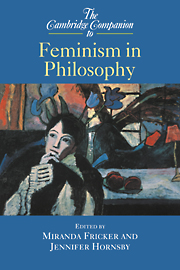Book contents
- Frontmatter
- Introduction
- 1 Feminism in ancient philosophy
- 2 Feminism in philosophy of mind
- 3 Feminism in philosophy of mind
- 4 Feminism and psychoanalysis
- 5 Feminism in philosophy of language
- 6 Feminism in metaphysics
- 7 Feminism in epistemology
- 8 Feminism in epistemology
- 9 Feminism in philosophy of science
- 10 Feminism in political philosophy
- 11 Feminism in ethics
- 12 Feminism in ethics
- 13 Feminism in history of philosophy
- Further reading
- Index
7 - Feminism in epistemology
Exclusion and objectification
Published online by Cambridge University Press: 28 May 2006
- Frontmatter
- Introduction
- 1 Feminism in ancient philosophy
- 2 Feminism in philosophy of mind
- 3 Feminism in philosophy of mind
- 4 Feminism and psychoanalysis
- 5 Feminism in philosophy of language
- 6 Feminism in metaphysics
- 7 Feminism in epistemology
- 8 Feminism in epistemology
- 9 Feminism in philosophy of science
- 10 Feminism in political philosophy
- 11 Feminism in ethics
- 12 Feminism in ethics
- 13 Feminism in history of philosophy
- Further reading
- Index
Summary
Introduction
Philosophy leaves everything as it is, or so it has been said. Feminists do not leave everything as it is. We are always interfering, always fighting for something, always wanting things to be otherwise and better - even in philosophy itself. But if philosophy leaves everything as it is, shouldn't feminists leave philosophy as it is? If philosophy leaves everything as it is, then it cannot hurt women, and it cannot help women. To be sure, if philosophy leaves everything as it is, it leaves oppression as it is, but one should no more hope otherwise than one should hope for the stones to cry out for justice. Shouldn't feminists let philosophy be? Well, not everyone agrees with the one who said philosophy leaves everything as it is. Someone else began his meditations thus:
Some years ago I was struck by the large number of falsehoods that I had accepted as true in my childhood, and by the highly doubtful nature of the whole edifice that I had subsequently based on them. I realized it was necessary, once in the course of my life, to demolish everything completely and start again . . .
- Type
- Chapter
- Information
- The Cambridge Companion to Feminism in Philosophy , pp. 127 - 145Publisher: Cambridge University PressPrint publication year: 2000
- 18
- Cited by



